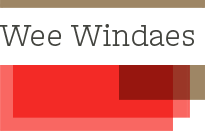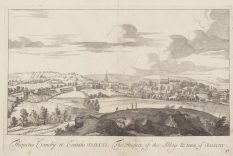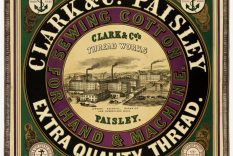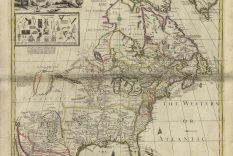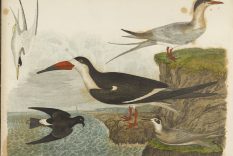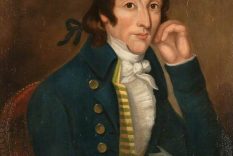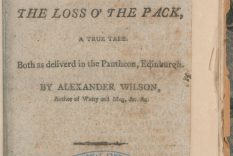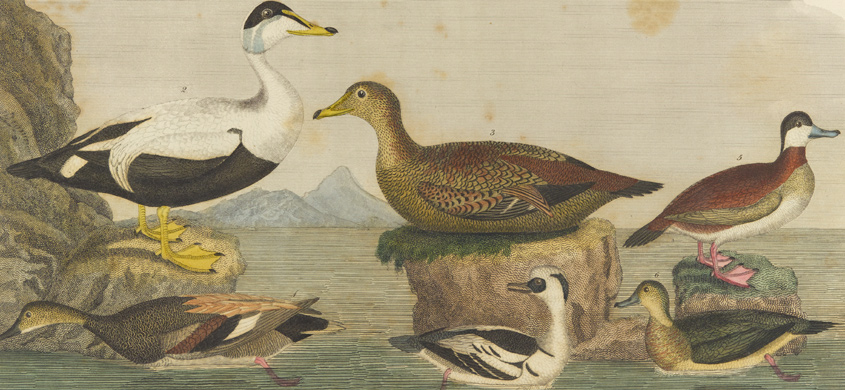
Born in Paisley in 1766, Alexander Wilson wis a wabster an Scots poet wha wid become kent as the Faither o American Ornithology. Greatly sweyed bi the ongauns o the American an French Revolutions, Wilson studied the polemics o
Thomas Paine an Thomas Jefferson an ettled tae scrieve his ain verse eftir the styles o Allan Ramsay, Robert Fergusson an Robert Burns.
As orator an democrat, Wilson wid traivel near 60 miles on fit frae Paisley tae Edinbrugh tae the communins o the Pantheon Debating Society whaur he delivert his airguments in Scots verse. Whiles in Scotland he wis prosecutit for scrievin satires forenent whit he seen as the shairp practices o Paisley mill owners.
Some time efter takkin passage tae America, on the day o Jefferson’s presidential inauguration Wilson delivert his ‘Oration on the power and value of national liberty, delivered to a large assembly of citizens at Milestown, Pennsylvania’. His love o natur an his traivels in Scotland as orator an whiles as a chapman wid staund him in guid steid fir his epic stravaigins oot-throu America as he clarkit an illustratit its muckle reenge o ornithology.
Lear mair aboot Alexander Wilson (1766-1813)
Wilson’s early life wis spent in Renfrewshire whaur his faither plied a tred – aiblins legally an illicitly – in whisky-distillin. Eftir bein indentured as prentice tae a wabster in Seedhills, Wilson wid syne lowse frae his tred an tak the gait for aroond twa year as chapman, traivellin on fit wi his pack in the sales o everyday gear.
Wi a guid kennin o the Scots poets he wid set aff on a faur-reengin commission tae seek subscribers for his ain verse, though this won him ainly limitit success. Wilson’s lang daunders through the Scottish kintraside, his pouers o observation an fondness for natur gart him weel prepared fir his future venture in America. Amang his compositions fir the Pantheon Debating Society in Edinbrugh are ‘Rab and Ringan’ an ‘The Laurels Disputit’.
‘Rab and Ringan – in a debate on the Question, “Whether is Diffidence, or the Allurements of Pleasure, the greatest bar to Progress in Knowledge”’ – gies a swatch intae Scots vocabulary an pronunciations in the late 18th century, whiles comparin Scots an English wirds sic as ‘kirk’ fir church an ‘yirth’ fir globe (or earth).
The antihero o the tale, Rab, whan takkin on the affectations o the English tung, faws intae ramstam an rackless habits. Meanwhiles his blithe an eyedent brither Ringan finds siccarness in his cawin as meenister. This micht be regairded as a reverse o the sociolinguistics o the time whan Scots comparit wi English wis bein regairdit as a provincial an less worthy leid. In ‘Rab and Ringan’ Wilson appears tae view Rab’s English affectations as fair-farrant an fawse.
In ‘The Laurels Disputit’ the poetic meerits o Allan Ramsay an Robert Fergusson are contestit. The wabster poet taks the side o Fergusson, takkin wi Ramsay’s ‘sleeness’ (skill, deftness, construction), but contends that the ‘leem o fire’ in Fergusson’s poetry – aiblins his ‘loom’ or artifice – gie’s mair pouer tae his verse an maks him the better bard forby.
In an 1816 Glesga owersettin o ‘The Laurels Disputit, Imprentit for an Sauld by James Duncan, Sautmercat’, the prenter willintly taks up the cause o the Scots leid on Wilson’s behoof:
‘The Scots o Wilson, as weil as the Scots o the lave o our poets, for a qhuyle bygane, has been sair shachlit, wi a mis-settan gate o spellin, borrowit frae our southland neibours. Sae the publisher thinks he dis a leil turn, baith tae the poet an the Scots leid, quhan he ettlis tae restoir the trew spellin.’
Wilson wid return tae wabsterin in Paisley whaur he scrievit his satires forenent mill owners wha transactit cloth frae local wabsters, in Wilson’s view throu usurious practices. Twa o Wilson’s poems, ‘The Hollander’ and ‘The Shark’ landit him in coort chairged wi defamation. ‘The Hollander’ alsae brocht aboot a chairge o blackmail forenent Wilson eftir an anonymous letter sent tae the intendit target o the satire offert tae retract the poem afore it wis imprentit on payment o a sum o siller. Wilson wis fined on baith chairges an spent a few nichts dubbed in the Paisley jyle afore bein ordert tae publicly burn a copy o his verse on the toon’s Tolbooth steps.
Wilson went on tae scrieve fir ‘The Bee or Literary Weekly Intelligencer’, fir which he scrievit an unfavourable review o ‘Tam o’ Shanter’ which editor James Anderson refused tae prent. Despite Burns receivin a copy o the review an subsequently upcastin Wilson in a letter, the wabster poet reportedly later spent a joco an hertie nicht wi Burns at Ellisland Farm.
Scartin a meagre livin as wabster an receivin smaw kennin as bard, wi ainly a puckle o siller an kittit wi a fowlin piece Wilson set oot across the Atlantic in May 1794, bidin in Pennsylvania whaur his learin wis sufficient tae siccar him wark as dominie at Milestown Schuil an at the Union Schuil at Gray’s Ferry.
Eftir encouragement frae naturalist William Bartram an wi a wheen o subscribers tae fund the ootset o the projeck, Wilson set oot in 1802 tae imprent a series o volumes descrivin the birds o North America. Traivelin thoosands o mile on fit, wi a Carolina parakeet on his shouder an airmed wi his fowlin piece, Wilson wid shoot ornithological specimens fir study an illustration. The result wis the acclaimed ‘Illustrations of the American ornithology of Alexander Wilson’, eventually heezin him tae fame as the foondin faither o American ornithology.
Copies o ‘Illustrations of the American ornithology’ wir treisurt bi eminent figures sic as Thomas Jefferson. Imprentit in nine volumes, it wis completit ane year eftir Wilson’s daith in 1814 bi Charles Lucian Boneparte, Prince of Canino and Musignano, a keen ornithologist an nephew o Napoleon. A rowth o Wilson’s warks survive in the Naitional Leebrar’s collections, wi 102 copies o Wilson’s bukes, pamphlets an fragments frae chapbuiks. Thair are several re-prents o the same titles. It hauds aw nine volumes o ‘Illustrations of the American ornithology’ (1808-1814).
The Leebrar alsae hauds some Wilson memorabilia cried ‘Wilsoniana’, includin letters, a silhouette an copies o the chairges forenent him relatin tae his satirical poem ‘The Hollander’.
Wilson met wi John James Audubon in 1810, an whiles Audubon’s illustrations are regairdit abune Wilson’s in technical skeel, it is thocht that Wilson had muckle influence on Audubon as the warld’s foremaist ornithological artist, an tae a generation o ornithologists forby.
Wilson’s illustrations alsae appear in the Natural History Museum Library publication ‘Owls: A selection of beautiful illustrations’, includin plates bi John Gould, J J Audubon an Edward Lear. An edition o this is held waein the Leebrar’s collections.
Alexander Wilson alsae featurs in Tom Leonard’s ‘Radical Renfrew; Poetry from the West of Scotland from the French Revolution to the First World War’, imprentit in 1990.
Born in Paisley in 1766, Alexander Wilson was a weaver and Scots poet who would become known as the Father of American Ornithology. Greatly influenced by the goings-on of the American and French Revolutions, Wilson studied the polemics of Thomas Paine and Thomas Jefferson and desired to write his own poetry after the styles of Allan Ramsay, Robert Fergusson and Robert Burns.
As orator and democrat, Wilson would walk almost 60 miles from Paisley to Edinburgh to the proceedings of the Pantheon Debating Society where he delivered his arguments in Scots verse. While in Scotland he was prosecuted for writing satires against what he saw as the corrupt practices of Paisley mill owners.
Sometime after emigrating to America, on the day of Jefferson’s presidential inauguration Wilson delivered his ‘Oration on the power and value of national liberty, delivered to a large assembly of citizens at Milestown, Pennsylvania’. His love of nature and his travels in Scotland as orator and for some time as a pedlar would stand him in good stead for his epic wanderings throughout America as he wrote down and illustrated its vast range of ornithology.
Learn more about Alexander Wilson (1766-1813)
Wilson’s early life was spent in Renfrewshire where his father plied a trade – possibly legally and illicitly – in whisky-distilling. After being indentured as apprentice to a weaver in Seedhills, Wilson would thereafter break from his trade and take to the road for around two years as a pedlar, travelling on foot with his pack in the sale of everyday goods.
With good knowledge of the Scots poets he would set off on a far-ranging commission to seek subscribers for his own poetry, though this brought him only limited success. Wilson’s long wanders through the Scottish countryside, his powers of observation and fondness for nature made him well prepared for his future venture in America.
Among his compositions for the Pantheon Debating Society in Edinburgh are ‘Rab and Ringan’ and ‘The Laurels Disputit’.
‘Rab and Ringan – in a debate on the Question, “Whether is diffidence, or the Allurements of Pleasure, the greatest bar to Progress in Knowledge”’ – gives a glimpse into Scots vocabulary and pronunciations in the late 18th century, while comparing Scots and English words such as ‘kirk’ fir church and ‘yirth’ fir globe (or earth).
The antihero of the tale, Rab, when taking on the affectations of English speech, descends into heedless and reckless habits. Meanwhile his thoughtful and industrious brother Ringan finds security in his vocation as minister. This might be regarded as a reverse of the sociolinguistics of the time when Scots in comparison with English was being regarded as a provincial and less worthy language. In ‘Rab and Ringan’ Wilson appears to view Rab’s English affectations as superficial and false.
In ‘The Laurels Disputit’ the poetic merits of Allan Ramsay and Robert Fergusson are contested. The weaver poet takes the side of Fergusson, and while taken with Ramsay’s ‘sleeness’ (skill, deftness, construction), he contends that the ‘leem o fire’ in Fergusson’s poetry – presumably his ‘loom’ or artifice – makes his verse more powerful and thus the better poet.
In an 1816 Glasgow publication of ‘The Laurels Disputit, Imprentit for an Sauld by James Duncan, Sautmercat’, the printer willingly takes up the cause of the Scots language on Wilson’s behalf:
‘The Scots o Wilson, as weil as the Scots o the lave o our poets, for a qhuyle bygane, has been sair shachlit, wi a mis-settan gate o spellin, borrowit frae our southland neibours. Sae the publisher thinks he dis a leil turn, baith tae the poet an the Scots leid, quhan he ettlis tae restoir the trew spellin.’
Wilson would return to weaving in Paisley where he wrote his satires against mill owners who transacted cloth from local weavers, in Wilson’s view through usurious practices. Two of Wilson’s poems, ‘The Hollander’ and ‘The Shark’ landed him in court charged with defamation. ‘The Hollander’ also brought about a charge of blackmail against Wilson after an anonymous letter sent to the intended target of the satire offered to retract the poem before it was published on payment of a sum of money. Wilson was fined on both charges and spent a few nights incarcerated in the Paisley jail before being ordered to publicly burn a copy of his verse on the town’s Tolbooth steps.
Wilson went on to write for ‘The Bee or Literary Weekly Intelligencer’, for which he wrote an unfavourable review of ‘Tam o’ Shanter’ which editor James Anderson refused to print. Despite Burns receiving a copy of the review and subsequently reproaching Wilson in a letter, the weaver poet reportedly later spent a jovial and convivial night with Burns at Ellisland Farm.
Scratching a meagre living as a weaver and receiving little recognition as a poet, with only a small sum of money and equipped with a fowling piece Wilson set out across the Atlantic in May 1794, living in Pennsylvania where his learning was sufficient to secure him work as teacher at Milestown School and at the Union School at Gray’s Ferry.
Following encouragement from naturalist William Bartram and with a quantity of subscribers to fund the beginnings of the project, Wilson set out in 1802 to publish a series of volumes describing the birds of North America. Travelling thousands of miles on foot, with a Carolina parakeet on his shoulder and armed with his fowling piece, Wilson would shoot ornithological specimens for study and illustration. The result was the acclaimed ‘Illustrations of the American ornithology of Alexander Wilson’, hoisting him to recognition as the founding father of American ornithology.
Copies of ‘Illustrations of the American ornithology’ were treasured by eminent figures such as Thomas Jefferson. Published in nine volumes, it was completed one year after Wilson’s death in 1814 by Charles Lucian Boneparte, Prince of Canino and Musignano, a keen ornithologist and nephew of Napoleon. A wealth of Wilson’s works survive in the National Library’s collections, with 102 copies of Wilson’s books, pamphlets and fragments from chapbooks. There are several re-prints of the same titles. It holds all nine volumes of ‘Illustrations of the American Ornithology’ (1808-1814).
The Library also holds some Wilson memorabilia called ‘Wilsoniana’, including letters, a silhouette and copies of the charges against him relating to his satirical poem ‘The Hollander’.
Wilson met with John James Audubon in 1810, and while Audubon’s illustrations are regarded as being above Wilson’s in technical skill, it is thought that Wilson had great influence on Audubon as the world’s foremost ornithological artist, and to a generation of ornithologists besides.
Wilson’s illustrations also appear in the Natural History Museum Library publication ‘Owls: A selection of beautiful illustrations’, including plates by John Gould, J J Audubon and Edward Lear. An edition of this is held within the Library’s collections.
Alexander Wilson also features in Tom Leonard’s ‘Radical Renfrew; Poetry from the West of Scotland from the French Revolution to the First World War’, published in 1990.
- Author:
- Alexander Wilson
- Publication Date:
- 1800
- Imprentit:
Paisley
‘The Hollander’
ATTEND a’ ye wha on the loom,
Survey the shuttle jinking,
Whase purse has aft been sucket toom,
While Willie’s scales war’ clinkin’,
A ye that fir some luckless hole,
Hae paid (though right unwilling),
To satisfy his hungry soul
A saxpence fir a shillin’,
Fir some fine day.Frae ‘The Hollander’
